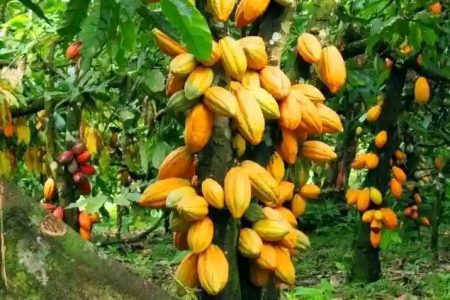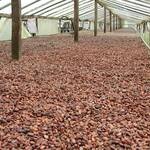Cocoa farmers sprang into spontaneous jubilation when President Nana Addo Dankwa Akufo-Addo announced 63.5% increase in the new cocoa producer price for the 2023/2024 cocoa season.
GH₵20,943 per tonne
The price increased from GH₵12,800 to GH₵20,943 per tonne.
GH₵1,308 per bag
This translates into GH₵1,308 per bag from the previous GH₵800 per bag.
When the President broke the news at a function at Tepa in the Ahafo-Ano Municipality, elated farmers rushed in front of the podium to express their excitement about the quantum increase of the producer price.
It took security details present to restrict some of them from climbing the podium in their joyous mood.
The President had to take a break in his speech for about five minutes to allow the farmers jubilate.
68% increase between 2016 and 2022
Cocoa prices have increased from GH₵7,600 per tonne in 2016, to GH₵12,800 per tonne in 2022, a significant increase of 68%.
This has had an adverse impact on COCOBOD’s financial performance,” he said.
It has now been increased from GH₵12,800 per tonne, to GH₵20,943 per ton, or GH₵1,308 per bag.
70.5% of FoB price
The new price is 70.5% of the Gross Free on Board (FoB) price, and is equivalent to $1,821 per tonne.
Highest in 50 years
President Akufo-Addo was proud that the new producer price is the highest price to be paid to cocoa farmers across West Africa in some 50 years.
With the predicted stable prices above $2,600 threshold, he said government will continue to honour famers with good prices in the years ahead.
President Akufo-Addo stated that, until recently, international prices of cocoa had remained very low, and made worse by COVID-19, adding that, in spite of this, COCOBOD and Government have been taking the very hard decision of increasing producer price of cocoa.
He acknowledged that the sustainability of the entire cocoa industry hinges on a well remunerated producer who is willing to invest in business only with the certainty that Government will pay the appropriate price.
According to him, Government in keeping with its promise to cocoa farmers increased the producer price.
Unprecedented transformation
Describing the cocoa landscape as witnessing an unprecedented transformation under his government, President Akufo-Addo noted that the productivity enhancement programmes being implemented by Ghana Cocoa Board (COCOBOD) are having a positive impact on productivity, incomes and climate resilience.
He said COCOBOD continues to undertake the rehabilitation of diseased farms free of charge through the programme, explaining that the programme entails a one-off payment of compensation to both the land owner and the tenant farmer, and involves cutting, treatment and replanting of the affected farm, and the maintenance of the farm for a period of two years before it is handed over to the farmer.
GH₵1,000 per hectare compensation
“In addition to the payment of compensation of GH₵1,000 per hectare, paid separately to both land owner and tenant, COCOBOD bears the entire cost of the cutting, treating, replanting and maintenance for two years before it is handed over to the farmer.
GH₵112.6m compensation paid
“Compensation paid to both landlords and famers stands at GH₵112.6 million (GH₵112,686,040) as at September 2022,” he said.
The President noted that COCOBOD has also rolled out a Contributory Scheme, under the new Three-Tier Pension Scheme for cocoa farmers. Enrolment has started, and will continue, and will, thus, make way for contributions from farmers and COCOBOD in the coming season.
GH₵74.5m to be paid into Pension Scheme
President Akufo-Addo noted that COCOBOD is expected to contribute some GH₵74.5 million to the fund this year.
“The Scheme will enable cocoa farmers also to save towards their retirement, so as to guarantee income security, improved living standards in their old age, and motivate the youth to venture into cocoa farming,” he stated.
President Akufo-Addo said “This is the first successful attempt to give effect to section 26(1) of the Ghana Cocoa Board Act, 1984, PNDCL 84, which provides for the setting up of the Scheme. This has been made possible because of the implementation of the cocoa management system, which has provided the needed data and digital foundation for the Scheme to be successful.”
$400 Living Income Differential
Co-operation between Ghana and Cote d’Ivoire, in the cocoa industry, he stated, has already yielded good results for the industry, following the adoption and implementation of the Living Income Differential (LID).
“The LID is an additional amount of $400 per tonne on the price of cocoa, paid on every ton of cocoa purchased from Ghana and Cote d’Ivoire.
“The LID is paid fully to the farmers, as a cushion to adverse effects of low international prices of cocoa.
“The LID has increased the average farmers’ income by $700 per tonne.
“It is the first successful attempt by producer countries to influence incomes of cocoa famers through an international pricing mechanism,” he added.
The President stated that government has also rolled out a digitisation programme to digitize all operations of the sector, enhance traceability and efficient management of the domestic supply chain, through a comprehensive, integrated digital database that captures farm and farmer information, including the physical conditions of farms and farmer household characteristics.
48% of cocoa beans processed locally
Under the industrialisation drive, he indicated that “value addition in the cocoa industry has increased significantly, from 30% of annual output in 2016 to 48% in 2022.
“The target of processing 50% of the production locally is within immediate reach.”
He said “The promotion of domestic consumption is also beginning to yield results. Domestic enterprises have emerged strongly under the 1D1F initiative for the processing and manufacturing of various cocoa based products across the Districts.
“COCOBOD has taken a giant step to support small scale and artisanal chocolate manufacturing with business-friendly guidelines that provide access to premium Ghanaian beans, even at the district level.”
130,000 jobs created
President Akufo-Addo noted that through these innovations, some 130,000 jobs have been created, reiterating that “Government will, through COCOBOD, continue to adopt innovations aimed at improving the welfare of the Ghanaian farmer through the implementation of productivity enhancement programmes and remunerative producer pricing.
Dr Bryan Acheampong, the Minister of Food and Agriculture, said cocoa was an extremely important commodity driving the development of the country.
He said the Ministry was mindful of the roles of farmers whose toils and sweats were sustaining the cocoa sector for the benefit of the nation.
“Ghana continues to pride herself as a global leader of cocoa production and the world’s best producer of quality cocoa beans because of the resolve and determination of our farmers,” the Minister acknowledged.
He also spoke about the challenges confronting the cocoa sector including smuggling and illegal mining and expressed his determination to tackle them head-on.
This year’s opening of the cocoa season is earlier than expected since October every year has been the date for the announcement of the opening of the season for the country’s main cash crop.
Mr Joseph Boahen Aidoo, Chief Executive of COCOBOD, said the decision to open the season earlier was to encourage farmers who have been hoarding their produce in anticipation of a new price, to release them to help prevent the beans from going waste.
He said with the low beans received during the light crop season, management believed that some farmers were hoarding the beans in anticipation of a new producer price for this year.
Mr Aidoo said changing the regime from October to September will also help farmers get money to pay their wards school fees and other expenses.
He said the producer price is determined by a review committee every year.
The Chief Executive said with the favourable weather patterns, which had resulted in adequate rainfall in the country this year and the success of the cocoa rehabilitation programme, resulting in the rejuvenation of most cocoa farms, the country was expecting high yields in cocoa production this year.
Cocoa futures in US hits $3,600
Cocoa futures in the US continued their upward trajectory, surpassing the $3,600 mark for the first time since March 2011, as traders anticipate a third successive global deficit in the coming 2023/24 season due to crop problems in West Africa.
The International Cocoa Organization (ICCO) said it forecast a global cocoa deficit of 116,000 metric tons in the current 2022/23 season (October-September), following a cut to expected global production of 42,000 tons to 4.938 million.
The downward revision to production was driven by a diminished outlook for Ghana where a crop of 700,000 tons was seen, down from 750,000 tons seen previously, impacted by adverse weather conditions.
Meanwhile, farmers in the Ivory Coast, which is the world’s largest cocoa producer, shipped 2.34 MMT of cocoa from Oct 1-Aug 27, down 3.3% on a yearly basis.
In the meantime, latest data showed ICE monitored cocoa inventories held in U.S. ports have steadily declined over the past three months to a 5-1/4 month low.
Cocoa is traded on New York Mercantile Exchange (NYMEX) and the Intercontinental Exchange (ICE) in London.
The prices in New York are based on the South-Asian market and prices in London are based on cocoa from Africa. The size of each cocoa contract on the NYMEX is 10 metric tons.
The biggest producers of cocoa are Ivory Coast and Ghana which together account for more than 60% of the world’s output.
Other major producers include: Indonesia, Nigeria, Cameroon, Ecuador and Brazil.
Although cocoa is one of the world’s smallest soft commodity markets, it has global implications on food and candy producers, and the retail industry.
- Friday, May 9, 2025 Newspaper Headlines - 9 May 2025
- Adangabey brightens rural kids’ future from his wheelchair - 9 May 2025
- Stanbic donates ICT equipment to UHAS for digital learning - 9 May 2025

